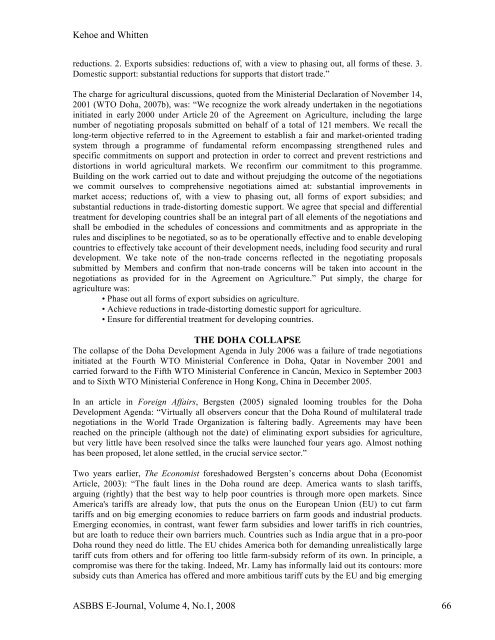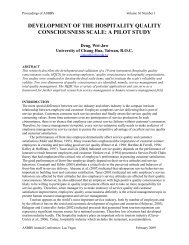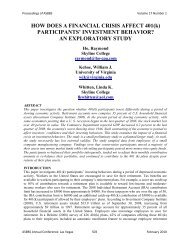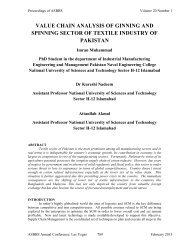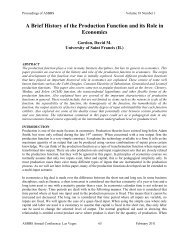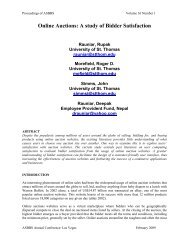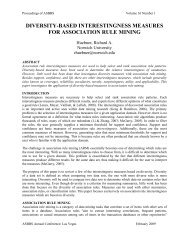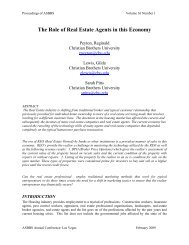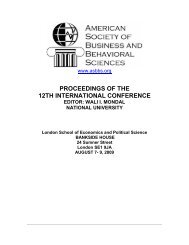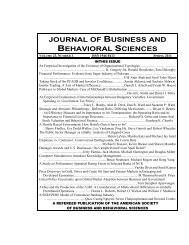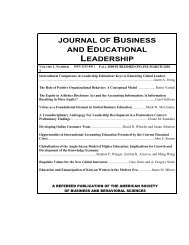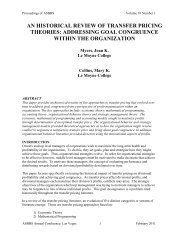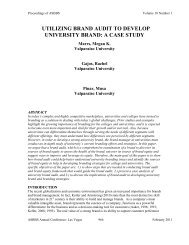stock repurchase announcements: a test of market ... - Asbbs.org
stock repurchase announcements: a test of market ... - Asbbs.org
stock repurchase announcements: a test of market ... - Asbbs.org
You also want an ePaper? Increase the reach of your titles
YUMPU automatically turns print PDFs into web optimized ePapers that Google loves.
Kehoe and Whitten<br />
reductions. 2. Exports subsidies: reductions <strong>of</strong>, with a view to phasing out, all forms <strong>of</strong> these. 3.<br />
Domestic support: substantial reductions for supports that distort trade.”<br />
The charge for agricultural discussions, quoted from the Ministerial Declaration <strong>of</strong> November 14,<br />
2001 (WTO Doha, 2007b), was: “We recognize the work already undertaken in the negotiations<br />
initiated in early 2000 under Article 20 <strong>of</strong> the Agreement on Agriculture, including the large<br />
number <strong>of</strong> negotiating proposals submitted on behalf <strong>of</strong> a total <strong>of</strong> 121 members. We recall the<br />
long-term objective referred to in the Agreement to establish a fair and <strong>market</strong>-oriented trading<br />
system through a programme <strong>of</strong> fundamental reform encompassing strengthened rules and<br />
specific commitments on support and protection in order to correct and prevent restrictions and<br />
distortions in world agricultural <strong>market</strong>s. We reconfirm our commitment to this programme.<br />
Building on the work carried out to date and without prejudging the outcome <strong>of</strong> the negotiations<br />
we commit ourselves to comprehensive negotiations aimed at: substantial improvements in<br />
<strong>market</strong> access; reductions <strong>of</strong>, with a view to phasing out, all forms <strong>of</strong> export subsidies; and<br />
substantial reductions in trade-distorting domestic support. We agree that special and differential<br />
treatment for developing countries shall be an integral part <strong>of</strong> all elements <strong>of</strong> the negotiations and<br />
shall be embodied in the schedules <strong>of</strong> concessions and commitments and as appropriate in the<br />
rules and disciplines to be negotiated, so as to be operationally effective and to enable developing<br />
countries to effectively take account <strong>of</strong> their development needs, including food security and rural<br />
development. We take note <strong>of</strong> the non-trade concerns reflected in the negotiating proposals<br />
submitted by Members and confirm that non-trade concerns will be taken into account in the<br />
negotiations as provided for in the Agreement on Agriculture.” Put simply, the charge for<br />
agriculture was:<br />
• Phase out all forms <strong>of</strong> export subsidies on agriculture.<br />
• Achieve reductions in trade-distorting domestic support for agriculture.<br />
• Ensure for differential treatment for developing countries.<br />
THE DOHA COLLAPSE<br />
The collapse <strong>of</strong> the Doha Development Agenda in July 2006 was a failure <strong>of</strong> trade negotiations<br />
initiated at the Fourth WTO Ministerial Conference in Doha, Qatar in November 2001 and<br />
carried forward to the Fifth WTO Ministerial Conference in Cancún, Mexico in September 2003<br />
and to Sixth WTO Ministerial Conference in Hong Kong, China in December 2005.<br />
In an article in Foreign Affairs, Bergsten (2005) signaled looming troubles for the Doha<br />
Development Agenda: “Virtually all observers concur that the Doha Round <strong>of</strong> multilateral trade<br />
negotiations in the World Trade Organization is faltering badly. Agreements may have been<br />
reached on the principle (although not the date) <strong>of</strong> eliminating export subsidies for agriculture,<br />
but very little have been resolved since the talks were launched four years ago. Almost nothing<br />
has been proposed, let alone settled, in the crucial service sector.”<br />
Two years earlier, The Economist foreshadowed Bergsten’s concerns about Doha (Economist<br />
Article, 2003): “The fault lines in the Doha round are deep. America wants to slash tariffs,<br />
arguing (rightly) that the best way to help poor countries is through more open <strong>market</strong>s. Since<br />
America's tariffs are already low, that puts the onus on the European Union (EU) to cut farm<br />
tariffs and on big emerging economies to reduce barriers on farm goods and industrial products.<br />
Emerging economies, in contrast, want fewer farm subsidies and lower tariffs in rich countries,<br />
but are loath to reduce their own barriers much. Countries such as India argue that in a pro-poor<br />
Doha round they need do little. The EU chides America both for demanding unrealistically large<br />
tariff cuts from others and for <strong>of</strong>fering too little farm-subsidy reform <strong>of</strong> its own. In principle, a<br />
compromise was there for the taking. Indeed, Mr. Lamy has informally laid out its contours: more<br />
subsidy cuts than America has <strong>of</strong>fered and more ambitious tariff cuts by the EU and big emerging<br />
ASBBS E-Journal, Volume 4, No.1, 2008 66


